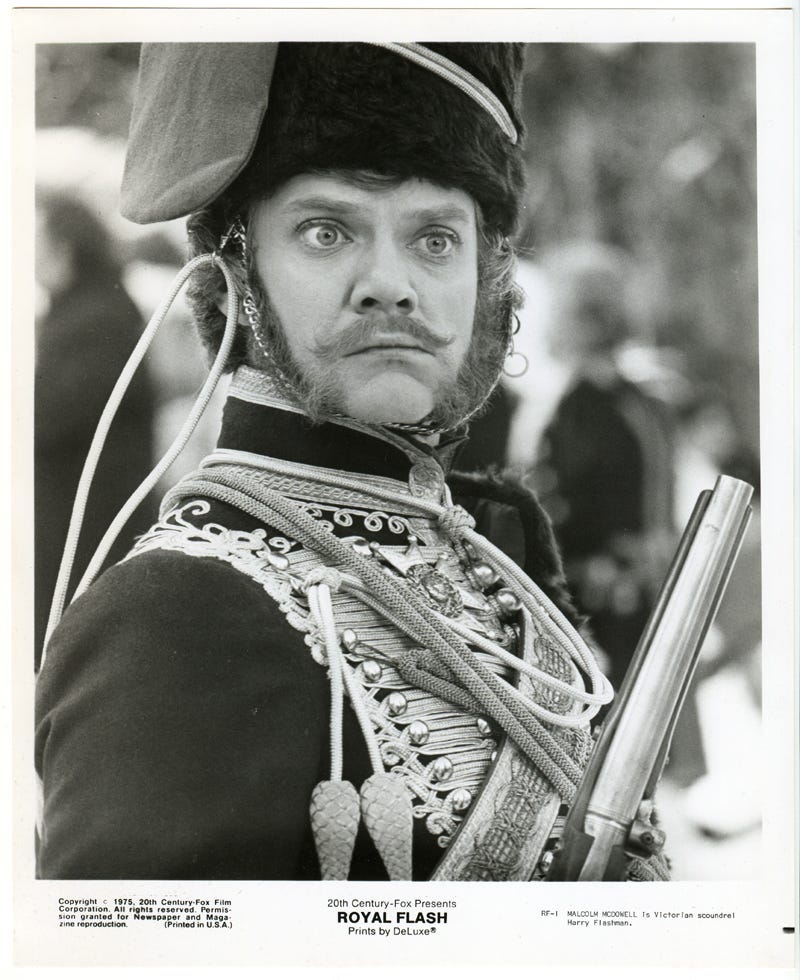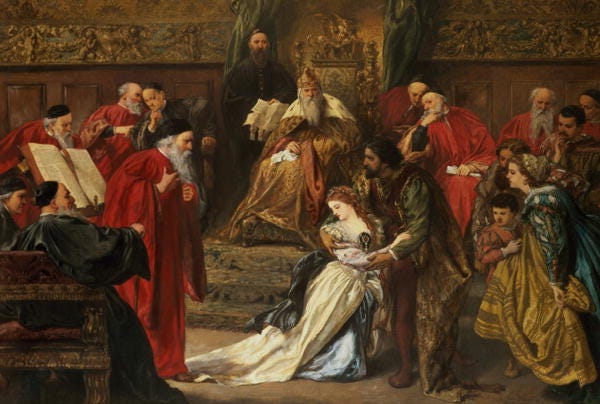Should We Read to Emulate or to Appreciate a Character?
Should we read to emulate a character or to appreciate them? By reading to emulate, I mean seeking characters whose traits we find admirable and whose actions we find worthy of emulation — should we ever find ourselves in similar situations. In other words, reading about characters we would like to be, whose virtues and abilities we would like to emulate, at least in our imaginations.
Military fiction — a Hornblower or Sharpe novel, for instance — allows us to imagine ourselves a gallant sailor or rifle company officer, triumphing over enemies internal and external through a combination of intelligence, toughness, and courage.
Unless we happen to be soldiers ourselves, our desire to emulate these qualities has to be translated into other fields of life. But life as the employee of a corporation, if less perilous to life and limb than that of the soldier or sailor, is still a struggle against enemies internal and external requiring intelligence, toughness, and courage. We can at least enjoy imagining ourselves telling off the managing director as Sharpe would, even if we never actually manage to replace our feet of clay with a spine of steel.
For the most part, I suspect, our desire to emulate such worthy characters is expressed purely in our imaginations. (I am no more bold or brave or cunning than I ever was for all the Sharpe and Hornblower books I have read.) We enjoy imagining ourselves displaying the same courage or compassion or understanding, or wiliness, or whatever the salient virtue of the hero may be. It is to be hoped that such imaginings might actually prepare us to act more virtuously in real life. But as a reason for reading, the pleasure of imagining ourselves displaying these virtues may be reward enough, and certainly less taxing.
This is perhaps something close to what people mean when they say that they identify with a character, though I’m not certain it is exactly the same thing. It is also what parents and grandparents tend to look for when buying books for their children and grandchildren. They are hoping to shape their characters by emulation.
But what then are we to make of Flashman? Like Bernard Cornwell’s Sharpe, George Macdonald Fraser’s Harry Flashman is a soldier who finds himself involved with historical battles and inappropriate and sometimes treacherous women. But Flashman’s adventures are characterized by his foolishness, weakness, and cowardice. He is hardly a character to emulate, yet the books enjoy a wide following.
But if Flashman is not a character to emulate, he might, perhaps, be a character to appreciate. By appreciating a character, I don’t mean approving of them. Per Oxford via Google, appreciate means:
recognize the full worth of.
"she feels that he does not appreciate her"
understand (a situation) fully; recognize the full implications of.
"they failed to appreciate the pressure he was under"
I mean appreciate in the sense in which we might say to someone, “I appreciate your point of view,” meaning that I understand what they see and what they feel and why they see it and feel it, not that I necessarily agree with it or see it the same way myself. Indeed, we only use that phrase when we don’t agree. If we agreed, we would say, “I share your point of view”. When we say “I appreciate your point of view” we mean we understand it but don’t agree with it.
Why don’t I simply use the word “understand” here? Because there is something much too clinical about “understand”. It tends to lead us into psychoanalyzing and dissecting a person in a superior sort of way that leads to an ad hominem dismissal of their experiences and beliefs. This is precisely what the storyteller should not be doing. Their job is not to shrink but to expand.
To appreciate a character is to imaginatively walk a mile — or more — in their shoes. To appreciate is not to judge or analyze, nor is it to admire or emulate; it is to see and feel life as they experience it. Understanding is intellectual. Appreciation is experiential. Storytellers are in the experience business.
As readers, we should not seek to emulate Harry Flashman, nor admire him, but we can appreciate him. And if we appreciate him, we will appreciate the human condition more fully and broadly than we ever would by reading only about Sharpe and Hornblower, sterling exemplars of courage and ingenuity though they may be. And Flashman, though Fraser paints him with a very broad brush, is probably, at his core, far more true to life than Sharpe or Hornblower.
Of course, it is possible to both emulate and appreciate a character at the same time. We can both emulate and appreciate Elizabeth Bennet, for instance. But our literature and our experience would be much less rich if we only read characters we could both emulate and appreciate. We would hardly wish to emulate Emma Bovary, Miss Havisham or Mr. Mikawber, but we can certainly appreciate them.
Appreciation for a character may come easier for those who have more in common with them. A father of daughters will likely have a more ready appreciation for King Lear or Mr. Bennet than perhaps his daughters will. But appreciation is something we can have even for people very different from ourselves, and the ability to enhance such appreciation is perhaps the chief social virtue of the novel. Surely one of the virtues of stories like King Lear or Pride and Prejudice is that they may give daughters a keener appreciation of their fathers lives, fears, and actions.
Reading for appreciation can be something of a purifying exercise as well, even if purity is not a characteristic of the characters we are coming to appreciate. A character held up for emulation is generally surrounded by a cast of progressively less worthy characters. Secondary characters are lesser beings, essentially. Those who are virtuous are less able. Those who are able are less virtuous. To emulate the hero on their pedestal is to elevate ourselves onto a pedestal of our own. And from that pedestal, we may be tempted to look down. It is an attractive perspective to enjoy, but it is not particularly good for our character. The imaginary emulation of heroes may lead us to pride and contempt as easily — or perhaps more easily — than it leads us into heroism.
Reading for emulation is beset with other snares. The characters we wish to emulate can be shaped by ideology. I saw an article recently that argued that it is Lydia Bennet, the wild child who runs off to conduct an illicit affair with the scoundrel Mr. Wickham, not the prudent (if proud) Elizabeth Bennet, who should be held up for emulation in Pride and Prejudice — on the grounds that she pursued her desires of the moment with no thought to the consequences for herself or others. This used to be thought the conduct of a fool. Now, in some circles at least, it is regarded as an act of heroic autonomy. (Perhaps the same critic would be a fan of Emma Bovary as well.)
Risible as this suggestion is, though, it illustrates the point that characters created for emulation can, and often do, come with an ideological payload. They are not characters made as human beings actually are but as the advocates of some policy would wish them to be — or would wish us to think they are. Heroes of the Soviet Union.
But if we read for appreciation, if we read books written for appreciation, the effect is usually to disturb our simple ideological certainties. It makes our enemies human, even if it does not make them saints, or friends. It may not be easier to like them, but it will be harder to injure them.
This may be why tyrants tend to consider the arts subversive. It is not the screeds of opposing ideology that fatally undermine the tyrannical pattern of thought, but an appreciation for how much messier and more complex real life is than the simple reductionist creed of the ideologue. This is why cancel culture seeks to cancel. This is why book burners seek to burn. It is not the counter-argument they fear the most, but the full and messy picture of the human that is as corrosive of one ideology as it is of another.
The beauty of art designed for appreciation rather than emulation, though, is that the tyrant, their vision impaired by the limits of their ideological frame, is usually blind to its effect. This is why the tyrant tends to attack art broadly. They cannot see the barb that will catch in their flesh nor the charge that will detonate their foundations. Thus it is sometimes possible for art to subvert even within the frame established by the ideologue and enforced by their censors.
But the tyrant we should most seek to undermine through reading for appreciation is the one enthroned between our own ears. We should not read with pride to know and conquer. We should read with humility to appreciate and to forgive. This, ultimately, is a more important lesson, a more humanizing lesson, far more salutary for the development of our character, than anything we might learn from emulating an impossibly worthy hero or heroine. There is a reason that Miss Austen did not name her masterwork Wit and Intelligence after her heroine’s virtues, but Pride and Prejudice after her vices. Lizzy Bennet is more worthy of appreciation than of emulation, and that is a far better thing.
I am participating in a Bookfunnel sales promo, Must Read Historical Fiction (they couldn’t call it that if it wasn’t true!) As with other promos, it helps my reputation on BookFunnel if you click through, even if you don’t buy anything. But hey, you could buy a copy of The Wistful and the Good through the promo. And you might find something else you like as well. Thanks!






Great piece! I want to say I "appreciate" it, but in the first, not the second, sense!
The preponderance of "emulatable" characters, at the expense of "appreciatable" ones, is something I find to be quite obnoxious in my own religion's works of literature and film. I think you've delineated a very important distinction that needs to be kept in mind more often. Thanks for writing!
emulation vs appreciation is a good way of looking at it. one of the most satisfying experiences in reading literature is finding myself invested in the cares and struggles of a flawed character. i may admire, envy, or even live vicariously through a seemingly perfect character. but imperfection is what makes characters human to me. still being able to find some compassion for their suffering is what makes me appreciate less-than-exemplary characters. at that point, liking or approving is irrelevant.